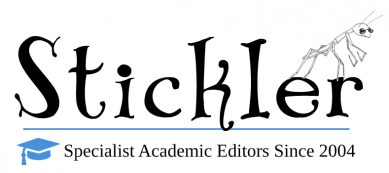You’ve done the hard work—researching, putting down your thoughts, and formatting your essay or paper. Now, it’s time to edit.
“But I thought you guys were in charge of editing?” you might ask. That is of course true, but your paper will be much stronger if you edit your content yourself, to the best of your ability, before passing it on to us. You might not catch every mistake, but even thinking “This doesn’t seem right to me” about a sentence shows that you know more than you think.
Here are 10 major editing tasks you should aim to complete before submitting your work to a professional copy editor.
- Create an outline of the paragraphs you actually have.
Many teachers will tell you to create an outline before you start writing. However, formulating an outline of what you have actually written makes sense, too. You’ll see what you’ve already got, what’s missing, and what would be the optimal order for your paragraphs and sections.
- Read just for flow and logic.
Here’s one way to think about it: if a sentence raises questions, the next sentence—or, at the very latest, the next section—should answer those questions. Otherwise, you’re sure to confuse your reader.
- Find all clichés and re-write them.
Your initial drafts might have a lot of clichés because you weren’t writing for quality; however, clichéd writing is bloated and, worse, unexciting. Writers at The Washington Post have compiled an excellent list of clichés to eliminate in your own writing.
- Read your paper out loud.
This is a real favorite of writers everywhere. When you read aloud, you proceed more slowly and can hear the rhythm of your writing. As a very simple rule of thumb, if you have run out of breath before get to the end of a sentence, that sentence may be too long. If a sentence seems too complex, your reader will probably get lost reading it.
Bonus: Although we recommend looking for grammar errors once your content and logic is sound, you will also catch a lot of grammatical errors through reading aloud.
Once you have gotten your content the way you like it, you can look for grammatical errors. The following big errors can sink a paper.
- Check for too much passive voice.
Some people think passive voice (where the subject is acted upon—there’s passive voice right there) is never good. We think it’s needed in some contexts, but make sure active voice is used wherever possible, as it makes your paper more dynamic and keeps wordiness to a minimum.
- Ensure your antecedents are clear.
Antecedents are the words that pronouns refer to. For example, consider the following:
“This finding is significant, but it does not explain the anomaly cited above.”
“it” is the pronoun that refers to the “finding.” Now imagine a similar sentence:
“This finding does not explain the anomaly cited above; however, it is significant.”
Does “it” here refer to the finding or the anomoly? Sense suggests the former is most likely, but this is unclear from a grammatical perspective. At the very least, the reader might have to go over the sentence a second time to ensure they have understood you, which is far from ideal.
It’s easy to confuse your reader with “unanchored” pronouns in this manner, so make sure your antecedents and pronouns can be easily matched.
- Check for shifting verb tenses.
Be sure that your verb tenses do not shift unnecessarily. For example,
“These authors suggested a new theorem. They find that…
would read much better as
“These authors suggested a new theorem. They found that…”
or
“These authors suggest a new theorem. They find that…”
- Make sure you apply parallelism.
Parallelism, or parallel construction, involves using similar clause or phrase structures in order to create balanced sentences. For example, take the following, poorly constructed, sentence:
“We conducted our study during May–June 2016, and this involved disseminating a questionnaire, to conduct interviews, and completed observations.”
In the list of things that the authors did, “disseminating,” “to conduct,” and “completed” are all grammatically different. The sentence would be improved if it were as follows:
“We conducted our study during May–June 2016. This involved disseminating a questionnaire, conducting interviews, and completing observations.”
Here, “disseminating,” “conducting,” and “completing” are grammatically consistent.
- Fix comma splices and run-on sentences.
Occasionally, instead of using a period to end one sentence and begin another, some people use a comma instead. These comma splices are easily fixed by using a period to separate sentences or by using an appropriate conjunction, such as “and” or “but.” For example,
“We conducted our study in Israel, our sample involved an equal number of male and female participants.”
is better as
“We conducted our study in Israel, and our sample involved an equal number of male and female participants.”
or,
“We conducted our study in Israel. Our sample involved an equal number of male and female participants.”
A run-on sentence is similar, with no punctuation defining the end of sentences. The sentence appears to “run away” without end.
“We conducted our study in Israel our sample involved an equal number of male and female participants.”
There are two full clauses or sentences in the above example. Thus, run-on sentences can be fixed in a similar way to comma splice errors.
- Always, always run a spell check!
We know how tedious this can be in a lengthy paper full of citations, but it is extremely important as a final step. Running a spell check will enable you to locate the most egregious errors and avoid embarrassing typos. However, you’ll have to look for subtler mistakes (two vs. too, for example) by hand—or have us do it for you!


















